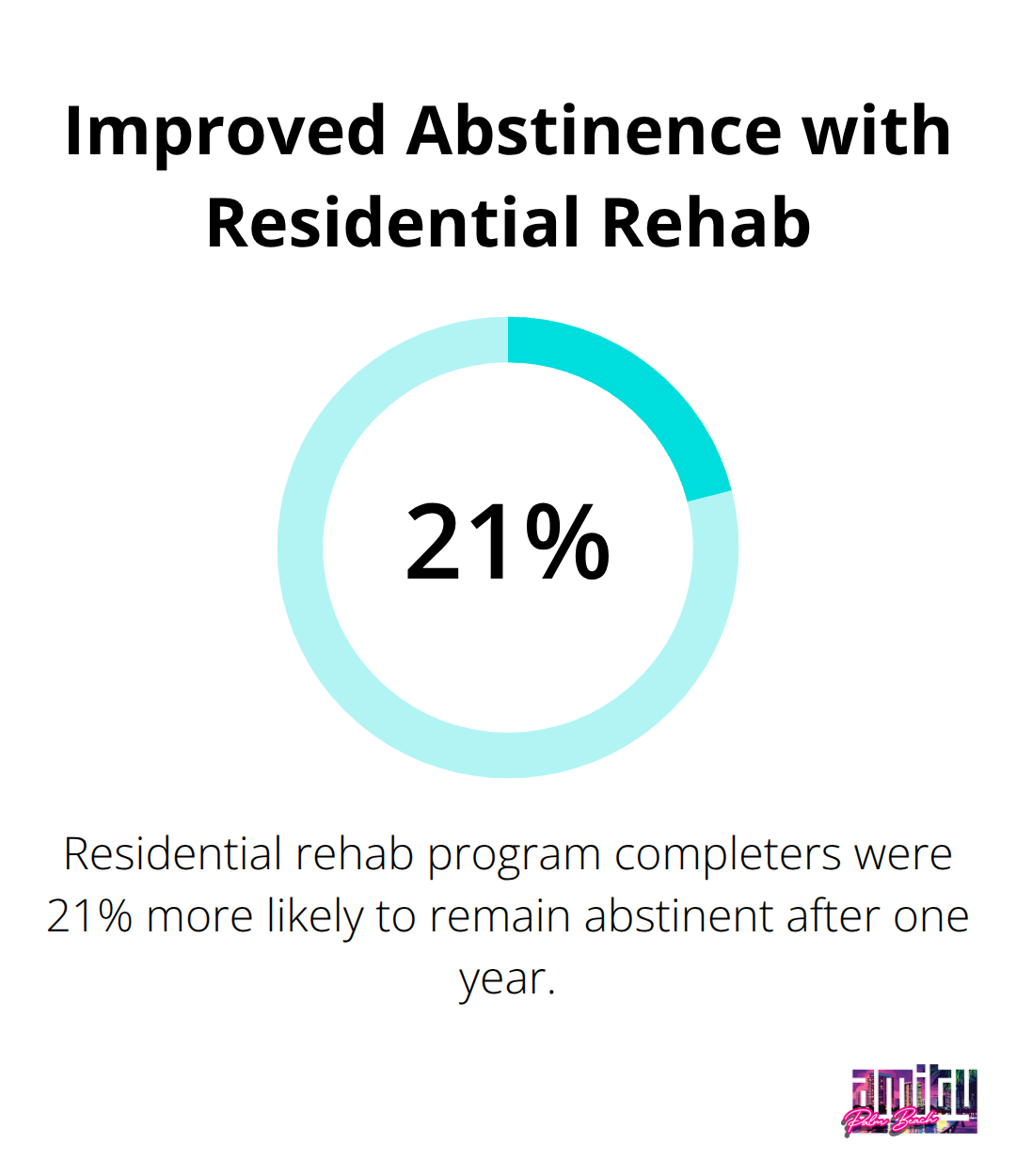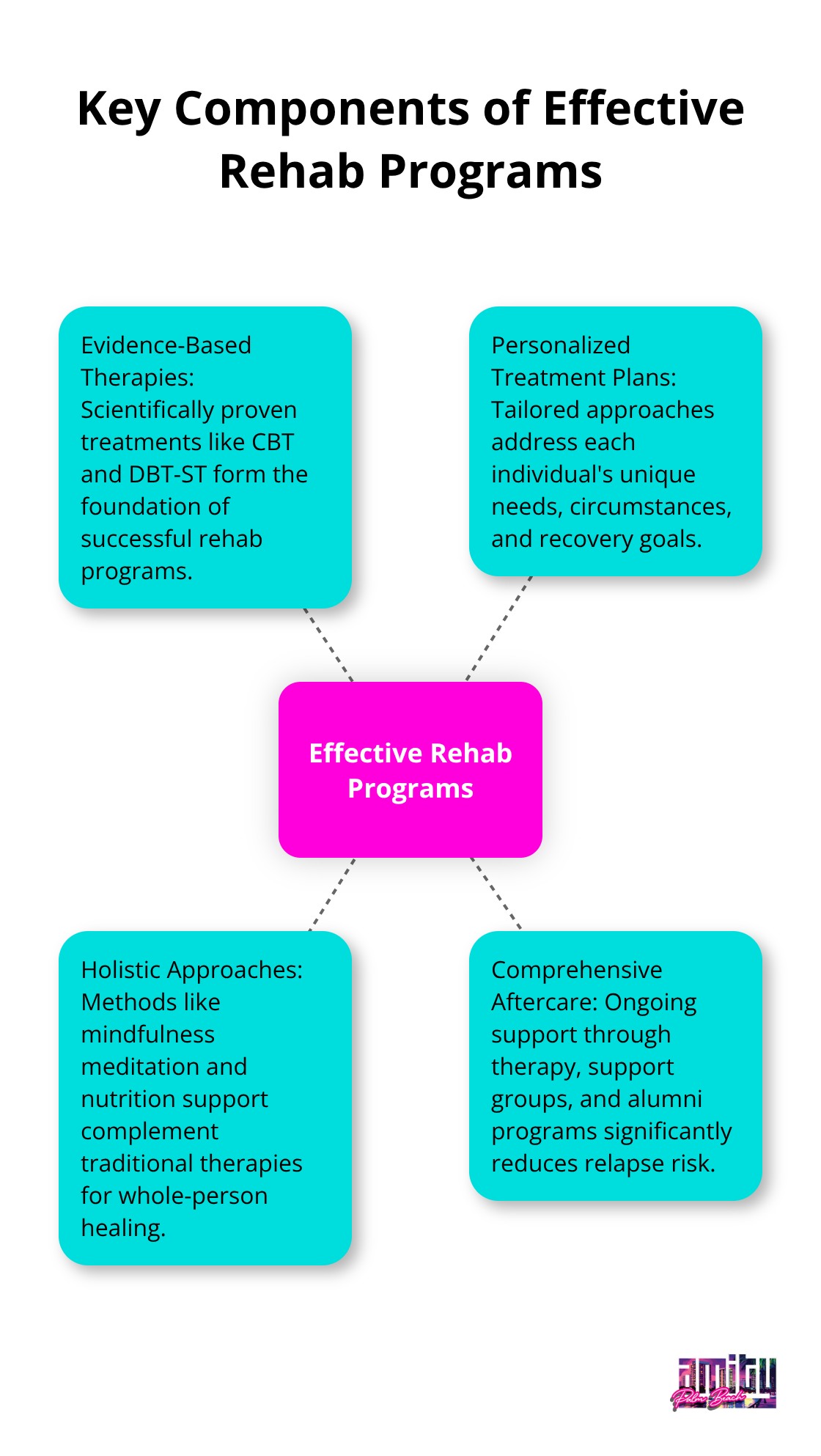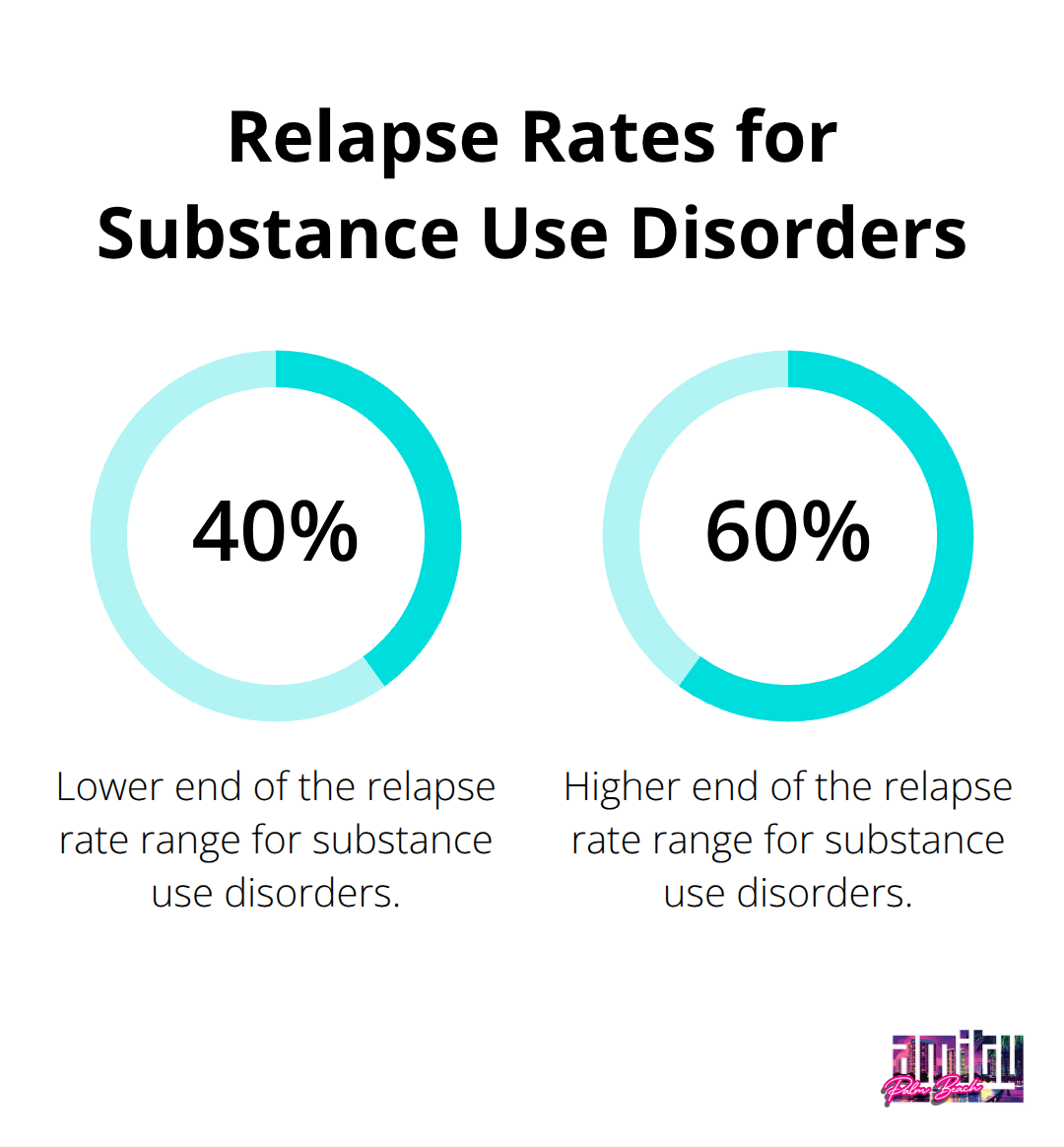At Amity Palm Beach, we understand the importance of clear information when it comes to addiction treatment. Rehab centers play a vital role in recovery, but many people are unsure about what they actually are.
This guide will provide a comprehensive rehab centers definition, explore the different types of facilities available, and help you understand how to choose the right treatment option for your needs.
What Are Rehab Centers?
Types of Rehab Centers
Rehab centers are specialized facilities that help individuals overcome addiction and substance use disorders. At Amity Palm Beach, we offer various treatment options to address the diverse needs of our clients.
Inpatient rehab centers provide round-the-clock care and support. Patients live at the facility for their treatment duration (typically 30 to 90 days). This intensive approach often suits those with severe addictions or co-occurring mental health disorders.
Outpatient rehab centers allow patients to live at home while attending scheduled treatment sessions. This option works well for individuals with milder substance use issues or those who transition from inpatient care.
Residential rehab centers offer a middle ground between inpatient and outpatient care. Patients live in a structured environment but may have more freedom than in inpatient settings.
Services Offered in Rehab Facilities
Most rehab centers provide a combination of evidence-based therapies and holistic approaches. Common services include:
- Medically supervised detoxification
- Individual and group therapy sessions
- Cognitive Behavioral Therapy (CBT)
- Medication-Assisted Treatment (MAT)
- Family therapy
- Relapse prevention education
- Aftercare planning
The National Institute on Drug Abuse states that effective treatment often combines behavioral therapy with medication, especially for opioid or alcohol use disorders.
The Impact of Rehab Centers on Addiction Treatment
Rehab centers play a significant role in helping individuals achieve and maintain sobriety. They provide a structured environment free from triggers and temptations, allowing patients to focus entirely on their recovery.
A study published in the Journal of Substance Abuse Treatment found that patients who completed a residential rehab program were 21% more likely to remain abstinent after one year compared to those who only received outpatient care.

Personalized Treatment Approaches
At Amity Palm Beach, we understand that each individual’s journey to recovery is unique. Our approach combines medical expertise with compassionate care, addressing not just the addiction itself but also underlying mental health issues and life circumstances that contribute to substance use.
We tailor treatment plans to each client’s specific needs, which may include a combination of traditional therapies (such as CBT and group counseling) and holistic approaches (like yoga and meditation). This personalized strategy helps increase the chances of long-term recovery success.
The Importance of Aftercare
Successful rehab programs don’t end when a patient leaves the facility. Aftercare is a critical component of long-term recovery. This may include ongoing therapy sessions, support group meetings (like Alcoholics Anonymous or Narcotics Anonymous), and regular check-ins with a counselor.
Many rehab centers (including Amity Palm Beach) offer alumni programs to provide continued support and community connection. These programs help individuals maintain their sobriety and navigate the challenges of post-treatment life.
As we explore the key components of effective rehab programs in the next section, you’ll gain a deeper understanding of what makes a treatment facility truly successful in supporting long-term recovery.
What Makes a Rehab Program Effective?
At Amity Palm Beach, we’ve witnessed the elements that create truly effective rehab programs. It’s not just about detox or therapy sessions; it’s about a comprehensive approach that addresses every aspect of addiction and recovery.
Evidence-Based Therapies
The foundation of any successful rehab program is evidence-based therapies. These treatments have scientific proof of their effectiveness. Dialectical Behavior Therapy Skills Training (DBT-ST) as a stand-alone treatment has been shown to be an effective intervention for alcohol use disorder (AUD) and other substance use disorders.

Personalized Treatment Plans
No two addictions are exactly alike, which is why one-size-fits-all approaches often fail. Effective rehab programs tailor treatment to each individual’s unique needs, circumstances, and goals.
This might involve a combination of therapies, such as CBT for addressing thought patterns, Motivational Enhancement Therapy for building commitment to change, and trauma-informed care for those with PTSD or past trauma.
Holistic Approaches
While evidence-based therapies form the core of treatment, holistic approaches can significantly enhance recovery. These methods address the whole person – body, mind, and spirit.
Mindfulness meditation, for instance, has shown to reduce the risk of relapse.
Nutrition also plays a key role. Many individuals enter rehab malnourished due to substance abuse. A balanced diet can help repair the body and stabilize mood.
Comprehensive Aftercare
Recovery doesn’t end when you leave the rehab facility. In fact, that’s when one of the most critical phases begins. Effective programs provide robust aftercare plans to support long-term sobriety.
This might include ongoing therapy sessions, support group meetings, and regular check-ins with counselors. Some facilities offer alumni programs, providing a supportive community for those in recovery.
The importance of aftercare can’t be overstated. Aftercare helps individuals manage triggers and cravings effectively, significantly reducing the risk of relapse.
These components work together to create truly effective rehab programs. The combination of evidence-based therapies, personalized care, holistic approaches, and comprehensive aftercare gives clients the best possible chance at long-term recovery. As we move forward, let’s explore how to choose the right rehab center that incorporates these essential elements.
How to Choose the Right Rehab Center
Assess Your Specific Needs
The first step in choosing a rehab center requires an honest assessment of your needs. Consider the severity of your addiction, any co-occurring mental health issues, and your personal preferences. If you struggle with severe opioid addiction and depression, you’ll want a facility that specializes in dual diagnosis treatment.
Evaluate Treatment Approaches
Look for centers that offer evidence-based therapies. Cognitive-behavioral therapy (CBT) for alcohol and other drug use disorders is a well-established intervention with demonstrated efficacy, with effect sizes in the small-to-moderate range. Many individuals find practices like mindfulness meditation or art therapy to be powerful complements to traditional treatments.
Check Credentials and Success Rates
Always verify a facility’s accreditation and licensing. Look for certifications from organizations like the Commission on Accreditation of Rehabilitation Facilities (CARF) or The Joint Commission. These indicate that the center meets high standards of care.
Ask about success rates, but be wary of centers that claim unrealistically high numbers. According to the National Institute on Drug Abuse, relapse rates for substance use disorders range from 40% to 60% (similar to other chronic diseases). A reputable center will be transparent about their outcomes and how they measure success.

Understand Financial Considerations
Treatment costs can vary widely. The Substance Abuse and Mental Health Services Administration (SAMHSA) reports that the average cost of residential treatment is about $20,000 for a 30-day program. However, many insurance plans now cover addiction treatment due to the Mental Health Parity and Addiction Equity Act.
Contact your insurance provider to understand your coverage. Many quality rehab centers offer insurance verification services to help you navigate this process. Don’t let financial concerns deter you from seeking help – there are often payment plans or sliding scale options available.
Visit and Ask Questions
If possible, visit potential rehab centers in person. Pay attention to the overall atmosphere and how staff interact with clients. Ask about their approach to treatment, staff-to-client ratios, and what a typical day looks like.
Some key questions to ask include:
- What specific therapies do you offer?
- How do you handle co-occurring mental health issues?
- What is your policy on medication-assisted treatment?
- What does your aftercare program look like?
- How do you involve family in the treatment process?
A good rehab center will welcome your questions and be transparent about their programs and policies.
Final Thoughts
Rehab centers provide structured environments and comprehensive care for individuals struggling with addiction. The rehab centers definition encompasses more than just detoxification; it represents a holistic approach to healing. These facilities combine evidence-based therapies, personalized care plans, and aftercare strategies to address physical, psychological, and emotional aspects of addiction.
Professional treatment significantly improves recovery success rates compared to attempting to overcome addiction alone. Choosing the right rehab center is a critical decision that can profoundly influence your recovery journey. It’s important to consider treatment approaches, accreditation, staff qualifications, and aftercare support when making this choice.
If you or a loved one struggles with addiction, help is available. At Amity Palm Beach, we offer compassionate, evidence-based care in a supportive environment. Our team of experienced professionals will guide you through every step of your recovery journey (from initial assessment to long-term aftercare).




